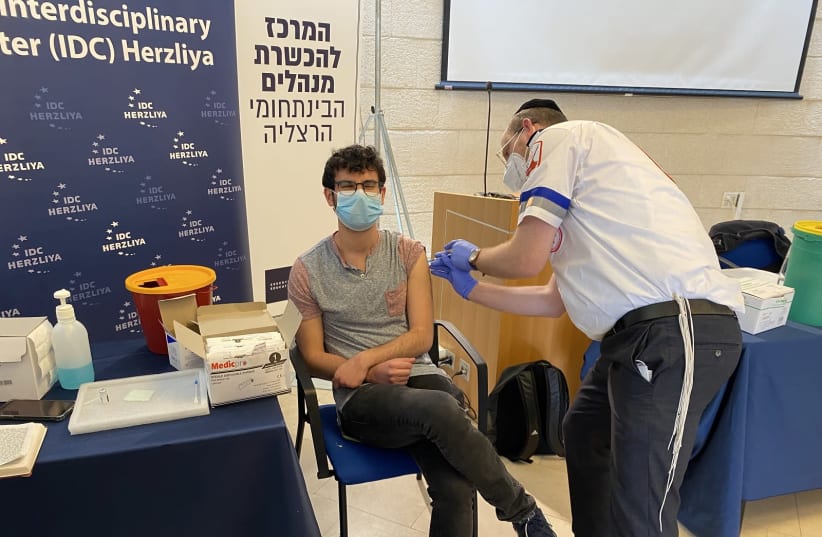A new shipment of Pfizer vaccines will be delivered on August 1 instead of September, Prime Minister Naftali Bennett announced Sunday.
All the current supply of vaccines Israel possesses is due to expire on July 31. As a result, individuals under 18 were not supposed to be able to receive a first shot until new vaccines arrived, being that three weeks must elapse between the first and second shots.
Israel currently has some 200,000 doses of Moderna, which are only authorized for adults.
However, thanks to the new deal, the vaccination campaign will continue.
“We have been working on the issue of vaccines for several weeks,” Bennett said. “This morning, I am pleased to announce that after a series of discussions with Pfizer CEO Albert Bourla, we closed a deal last night to move up the next vaccination delivery to August 1.”
“There are vaccines for everyone,” he said, and all those who have not been inoculated should do so.
Some 200,000 doses of vaccines are expected to be delivered on August 1.
Last week, Israel announced it had agreed on a vaccine-exchange deal with South Korea. Under the terms of the deal, Israel delivered some 700,000 doses to South Korea, which it will return when it receives its next vaccine delivery.
Immunocompromised patients will be able to receive a third shot of the Pfizer vaccine starting immediately, Health Minister Nitzan Horowitz said Sunday. The healthcare providers will determine who is eligible, he told KAN News. People with specific conditions, for example, who have had an organ transplant, will be eligible, he said.
In the meantime, Israel continues to register a higher number of daily cases. At the beginning of June, some 10-20 people were found to be new virus carriers every day. Currently, several hundred are testing positive on a daily basis.
Most days last week, Israel registered more than 500 cases. On Saturday, 261 new virus carriers were identified, but with a significantly lower number of tests, about 50,000. Previously, there were more than 70,000 each day.
As of 6 p.m. on Sunday, another 263 new virus carriers had been identified out of about 29,000 tests that were processed.
The number of active cases, which had dropped to fewer than 200 just a few weeks ago, currently stands at almost 4,000, marking a slight decline since the day before, the first decrease in several weeks.
At the same time, the increase in serious morbidity has remained low. As of Sunday night, there were 47 patients in serious condition. In April, with a similar number of active cases, there were more than 260.
At the coronavirus cabinet meeting last Wednesday, the ministers said the number of patients in serious condition would be the central parameter to determine the country’s strategy.
The cabinet is due to meet again on Tuesday to discuss possible new measures against the current outbreak.
The Health Ministry is going to discuss an outline to introduce a new form of “green pass” system for big gatherings, Health Ministry Director-General Nachman Ash told Channel 12 on Sunday, when his appointment was approved by the government.
According to the outline, participants would be required to undergo a rapid test. However, many logistical challenges remain, including how to deploy enough testing stations, how to enforce the system and who would pay for the tests.
“A wedding in September? I think it is a very precarious situation,” Ash said. “I don’t know if I would recommend it.”
He said he did not know what will happen in two months, adding that if the morbidity continues at this level, Israel could have a very high number of cases, even though probably not as many as in the past.
It is important to stop the current outbreak long before the number of serious patients overwhelms the health system, Ash said. The Health Ministry is considering what measures might be needed to reopen the school year safely, he said, denying that he was causing unnecessary panic.
Earlier in the day, Prof. Eran Segal, a computational biologist at the Weizmann Institute of Science in Rehovot who is an adviser to the government, said he did not believe Israel would reach the same number of serious patients it registered at the peak of the pandemic, which was about 1,200.
“Why do I think we are not going back to some 1,000 seriously ill patients in the hospitals?” he tweeted. “Because all it takes to return to the pre-Delta decline [in cases] is an additional number of individuals vaccinated or recovered. How many? It is not clear, maybe 500,000, maybe more.”
Before the contagious Delta variant spread in Israel, many experts thought the country had reached some form of herd immunity because the outbreaks were very limited for several months.
However, the rate of a population immune from the virus through inoculation or previous infection required to reach herd immunity increases as the ability of the virus to infect increases, as in the case of the Delta variant.
“Another 200,000 have been vaccinated in the last two weeks, and if some more among the 1.1 million we have not yet vaccinated get jabbed, that may be enough,” Segal wrote. “If not, the increase in new cases will continue. But this time, because of the vaccines, there will have to be many more cases than before to reach the same amount of seriously ill patients. According to our model, maybe even 500,000, which in itself will lead to many people recovering, who will help start a new decline [in cases].
In the UK, where the Delta variant is raging, there are eight to 10 times fewer people who succumbed to the virus, and three or four times fewer hospitalized patients, compared with the period before vaccinations started, Segal wrote.
